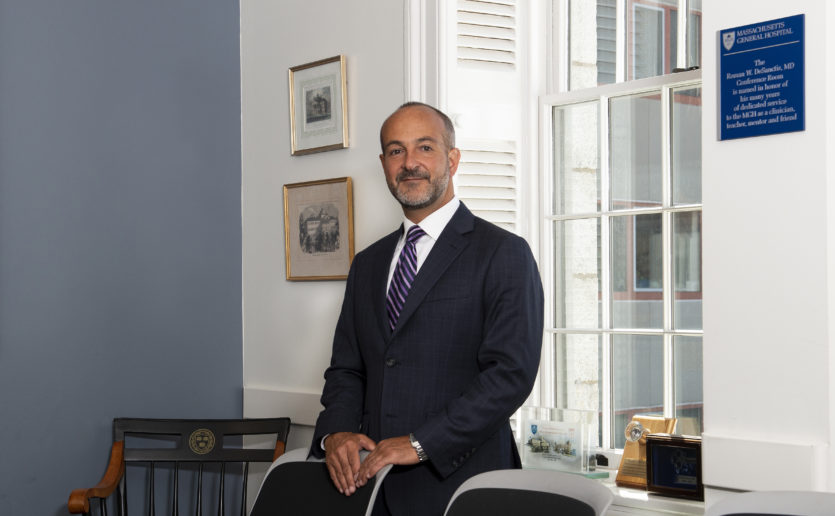Joseph Betancourt, MD, MPH, was recently named the first vice president and chief equity and inclusion officer at Massachusetts General Hospital. A nationally recognized expert on healthcare disparities and how to provide equitable and culturally competent care, Dr. Betancourt has directed Multicultural Education at Mass General since 2001, and The Disparities Solutions Center since 2005. He has served for nearly 20 years on the hospital’s Center for Diversity and Inclusion leadership team.
In a recent interview, Dr. Betancourt discussed plans to bring the hospital’s focus on equity and inclusion to a new level.
What inspires you to dedicate your career to equity and inclusion efforts?
I grew up in a bilingual, bicultural home, in part in Puerto Rico. I got to see firsthand the impact of race, ethnicity, culture, class and the social determinants of health on health care. I saw this not only with my family, but on my way to becoming a healthcare professional. For me, these issues are personal, they are a passion, they’re part of my DNA.
At Mass General, when disparities are found, we eliminate them.
What are some key examples of progress made through The Disparities Solutions Center?
We’ve worked with more than 100 hospitals in 33 states. We’ve seen that hospitals are not only paying more attention to disparities, but they are also building the infrastructure to monitor differences in quality of care. Like we do at Mass General, they are collecting race/ethnicity data to monitor their performance and are then developing interventions when they see gaps. A big area where we’ve seen improvement is in reducing disparities in hospital readmissions.
At Mass General, we were honored with the American Hospital Association’s Equity of Care award in 2014 for our early efforts. That included finding that Latino patients weren’t getting colonoscopies at the same rates as others and eliminating that disparity, as well as reducing disparities in diabetes. Since then, we’ve strengthened our measurement capacity. We identified, for example, a disparity in flu vaccinations. We also found a disparity in which at-risk pregnant women get antibiotics to prevent infection by group B streptococcus bacteria. When disparities are found, we eliminate them.
What more do you hope to accomplish as a hospital vice president?
We have many pockets of excellence with a focus on diversity and equity, but until now, no one to bring everyone together and synergize it all.
Previously, I focused on disparities in care both locally and nationally and advised our physicians’ diversity efforts. Now, I will be overseeing equity and inclusion efforts that span all four pillars of Mass General’s mission: research, education, clinical care and community health.
We have many pockets of excellence with a focus on diversity and equity at Mass General and incredible grassroots efforts. But what we haven’t had until now is somebody at a higher level to bring everyone together and synergize it all.
We will focus on increasing the diversity of our researchers, our research portfolio and of our research participants. We’ll do the same around diversity of our leaders, providers and patients. In training, we’ll make sure that we have integrated curricula for our doctors, nurses and frontline staff on how to communicate effectively with anybody we care for, no matter who they are or where they’re from. We’ll continue our work on measuring, monitoring and addressing disparities. We will also develop ways to measure inclusiveness and assure we work in an environment where our teams, and our patients, feel respected and valued. Finally, I will work in partnership with our leadership in community health to further expand our fantastic work.
We hope to achieve some foundational, measurable changes over the next three years.
What is an example of how you might achieve this?
I’d like to create an innovation lab so we can capture ideas from our caregivers and employees in each of the four areas of the hospital mission. It could be a technology innovation, such as text messaging to reach targeted populations, telehealth around mental health issues, or innovative ways to address some of the social determinants of health. Innovation may lead to new and creative ways to advance recruiting, retaining and promoting diverse individuals in our institutions. Those are the sorts of innovations that we hope to scale rapidly.
For us, this is a priority. There is a sense of urgency.
What lessons have you learned about human nature?
I’ve learned that ultimately you can’t get this work done without leadership buy-in and without data. People will resist change in the absence of real data, but once data is presented, they are more likely to commit to action.
How far off is a time when everyone is treated the same in healthcare settings and has the same chance at a good outcome?
For us, this is a priority. There is a sense of urgency. This isn’t an issue that is ever fully solved, but it is a journey we must commit to.
For more information about how you can support Mass General’s equity and inclusion efforts, please contact us.

